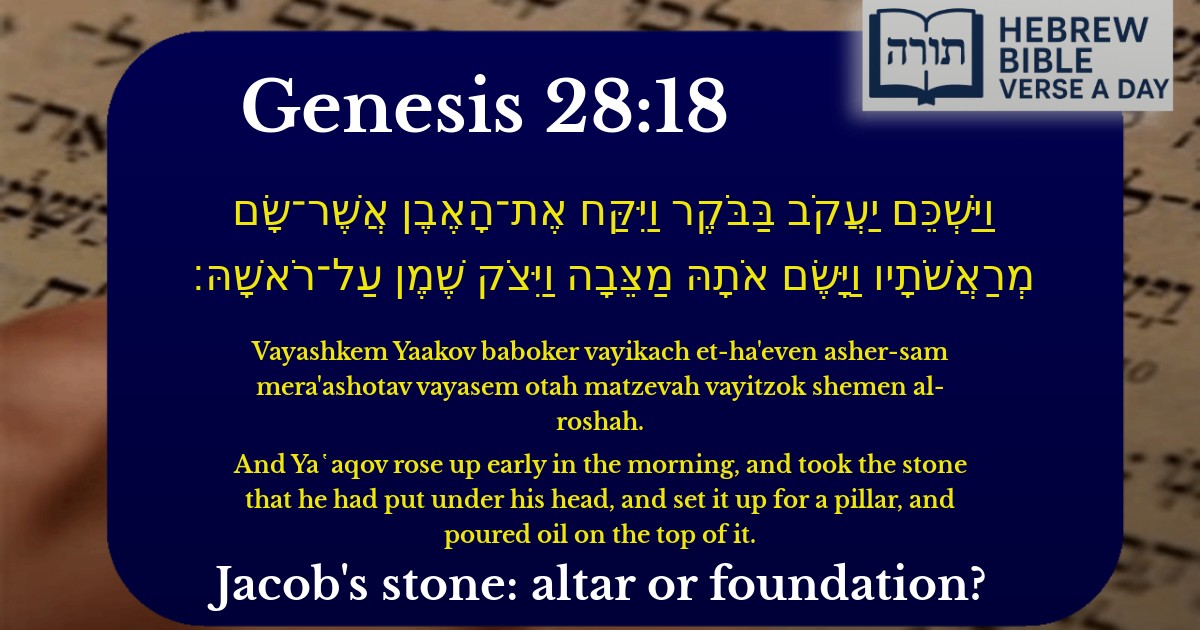Join Our Newsletter To Be Informed When New Videos Are Posted
Join the thousands of fellow Studends who rely on our videos to learn how to read the bible in Hebrew for free!
Hebrew Text
וַיַּשְׁכֵּם יַעֲקֹב בַּבֹּקֶר וַיִּקַּח אֶת־הָאֶבֶן אֲשֶׁר־שָׂם מְרַאֲשֹׁתָיו וַיָּשֶׂם אֹתָהּ מַצֵּבָה וַיִּצֹק שֶׁמֶן עַל־רֹאשָׁהּ׃
English Translation
And Ya῾aqov rose up early in the morning, and took the stone that he had put under his head, and set it up for a pillar, and poured oil on the top of it.
Transliteration
Vayashkem Yaakov baboker vayikach et-ha'even asher-sam mera'ashotav vayasem otah matzevah vayitzok shemen al-roshah.
Hebrew Leining Text
וַיַּשְׁכֵּ֨ם יַעֲקֹ֜ב בַּבֹּ֗קֶר וַיִּקַּ֤ח אֶת־הָאֶ֙בֶן֙ אֲשֶׁר־שָׂ֣ם מְרַֽאֲשֹׁתָ֔יו וַיָּ֥שֶׂם אֹתָ֖הּ מַצֵּבָ֑ה וַיִּצֹ֥ק שֶׁ֖מֶן עַל־רֹאשָֽׁהּ׃
וַיַּשְׁכֵּ֨ם יַעֲקֹ֜ב בַּבֹּ֗קֶר וַיִּקַּ֤ח אֶת־הָאֶ֙בֶן֙ אֲשֶׁר־שָׂ֣ם מְרַֽאֲשֹׁתָ֔יו וַיָּ֥שֶׂם אֹתָ֖הּ מַצֵּבָ֑ה וַיִּצֹ֥ק שֶׁ֖מֶן עַל־רֹאשָֽׁהּ׃
🎵 Listen to leining
Parasha Commentary
📚 Talmud Citations
This verse is quoted in the Talmud.
📖 Chullin 91b
The verse is referenced in a discussion about the actions of Jacob and the significance of his setting up the stone as a pillar and anointing it with oil.
📖 Megillah 16b
The verse is mentioned in the context of discussing the importance of early rising and diligence, as exemplified by Jacob's actions.


Yaakov's Morning Actions
The verse describes Yaakov's actions upon waking from his prophetic dream at Beit El. Rashi explains that Yaakov's early rising demonstrates his zeal in fulfilling a divine mission, as he immediately acts upon the revelation he received. The stone he used as a pillow now becomes a monument marking the sacredness of the place.
The Significance of the Stone
According to the Midrash (Bereshit Rabbah 68:12), the stone Yaakov took was not an ordinary one. The Talmud (Chullin 91b) suggests it was the Even HaShtiya (Foundation Stone) from which the world was created, later to be the site of the Mizbeach in the Beit HaMikdash. By setting it upright, Yaakov symbolically established a connection between heaven and earth.
Pouring Oil on the Pillar
Rambam (Hilchos Beis HaBechirah 1:15) notes that anointing with oil signifies consecration, as done later with the Mishkan's vessels. The Radak adds that this act mirrored future Temple service, where oil was used for anointing kings and sanctifying holy objects. The oil represents divine wisdom and the shefa (spiritual flow) from above.
The Pillar as a Monument